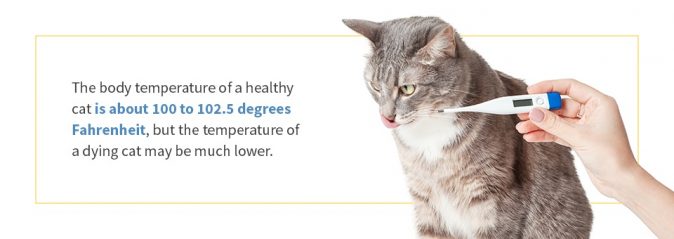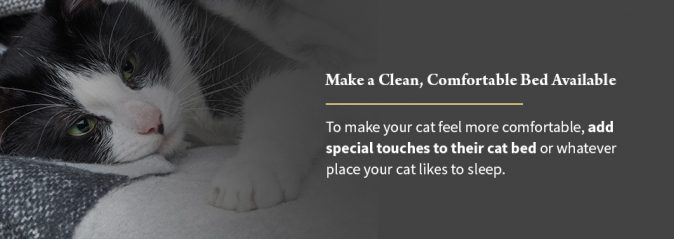We know- your cat is a cherished, devoted friend. When a dog is dying, they very clearly start to recluse and don’t have much energy.
But what happens with cats? For many cats, this is their normal behavior (which is sometimes why we love them).
With this article, we point out some common behaviors that cats exhibit when they’re feeling very sick or are getting ready to pass away.
Each cat is different and you know your cat best. If your cat’s behavior starts to change and worry you- you may want to see a vet.
For some, recognizing these behaviors for what they might be can help for preparing for that moment.
Common Signs a Cat Is Ready to Pass
Is your cat dying? Here are a few signs to watch for:
1. Changes in Behavior
Different types of behavior can occur for many reasons, but marked behavioral changes can be a sign that an elderly cat is getting ready to pass away. Your cat may lose interest in playing, become more aloof or become more social and want to be held — any number of changes could occur. Changes in appearance, such as if your cat becomes uninterested in grooming or unable to keep clean, can also be warning signs.
2. Lethargy
When the end is approaching, your cat may have much less energy for everyday activities. Your pet may be less energetic, spend more time sleeping and be much harder to rouse for attention, grooming or meals. Of course, cats typically sleep a lot, but if your elderly cat is sluggish and sleeping even more than normal, the change could be an important sign.
3. Loss of Appetite
Many cats become uninterested in food and water as their internal organs begin to shut down. If your elderly cat stops eating, and especially if your cat stops eating and drinking, you may need to think about end-of-life care and considerations.
4. Significant Weight Loss
Your furry friend may not be eating as much, or your cat’s body may not be absorbing nutrients the way it used to. Weight loss can occur for many reasons, but in an elderly cat, it may be a sign that the cat’s body is shutting down. If your ordinarily healthy and energetic older cat is suddenly skin and bones, you may need to start preparing for your companion’s passing.
5. Low Temperature

A terminally ill cat’s body temperature may drop significantly. The body temperature of a healthy cat is about 100 to 102.5 degrees Fahrenheit, but the temperature of a dying cat may be much lower. You can take your cat’s temperature with a thermometer if your cat is cooperative, or if the drop is severe, you may be able to feel the difference merely by laying your hand gently on your cat’s body.
6. Low Heart Rate and Respiration
Likewise, your cat’s heart rate and respiration may slow as its body begins to shut down. The resting heart rate for a healthy cat ranges from about 150 to 200 beats per minute, and a healthy cat takes about 20 to 30 breaths per minute. If you check your lethargic cat’s heart rate and find it sluggish, and if you notice your cat taking fewer breaths than usual, these are likely warning signs.
7. Disappearances
For a dying cat, seclusion is an instinctive response. It protects the cat from predators that prey on weakened animals. If your cat disappears for long stretches toward the end of its life, know that your furry friend is not hiding from you or excluding you.
How to Comfort a Dying Cat
If you believe your cat is dying, you’ll want to make your feline companion feel as comfortable and loved over the last few days as you possibly can. Here are a few suggestions for comforting a cat who is about to pass away:
1. Offer Special Treats
If your cat still has an appetite, offer tasty foods to help ease your cat’s last days. Particularly pungent smells, such as fish-flavored food, may help tempt your cat to eat. If your cat doesn’t feel up to chewing, try offering some canned food mixed with warm water, or you can try offering baby food. Just be sure to check the ingredients list for anything your cat can’t have.
2. Make a Clean, Comfortable Bed Available

To make your cat feel more comfortable, add special touches to their cat bed or whatever place your cat likes to sleep. Add extra blankets for cushioning, and be sure to change the blankets regularly if your cat is having trouble getting to the litter box.
You can also line the bottom of the bed with a small heating pad or electric blanket to help keep your cat warm and toasty. You’ll probably want to add extra blankets on top to keep the heating pad from making your cat too hot.
3. Put Your Cat’s Things Nearby
If your cat can still get up and about, make the last few days easier by moving the food bowl, water bowl and litter box close to the cat’s bed. Minimizing the effort your cat has to make throughout the day will help keep your feline friend more comfortable.
4. Spend Time Nearby
Your cat may want some space and prefer to sleep in a pet bed rather than snuggle. But you can still be a soothing presence by working, reading or watching TV quietly in the same room. And if your cat does want snuggles, be sure to provide lots of love.
5. Keep Your Cat’s Space Calm and Quiet
Try to keep your home calm and quiet, so your cat can rest peacefully. Minimize unfamiliar visitors if you can, and see if you can keep the commotion in your home to a minimum. If you have family gatherings or activities planned, try to have them take place outdoors or in other rooms.
You may also want to play quiet calming music or sounds to provide extra comfort and block out other noise — classical music, birds chirping or the sound of rainfall can help relax and soothe your cat.
6. Look Into Pain Medication
If your cat is ill and in significant pain, talk to your veterinarian about getting a prescription for painkillers. You can try putting the medication in your cat’s food, or you can give it by hand or with a special pilling instrument. Pain medication can make your cat much more comfortable and happy in those last few days.
I Think My Cat Is Dying: What’s Next?
If you think your cat is dying, the first step is to think about whether you’ll let your cat pass away naturally or talk to your veterinarian about medical options, especially if your cat is in significant pain.
The next step is to consider how you want to memorialize your cat. Here are a few possible options:
- Cremation services: Consider partnering with a reliable pet cremation company — cremation is safe and easy. Afterward, you can keep the cremains or say good-bye to your feline friend by scattering or burying them in a meaningful place. If you choose a communal cremation, the cremation company will likely spread or inter the cremains for you.
- Cat urns: After cremation, you may choose to store the cremains in a beautiful decorative urn to keep your cat’s cherished memory close. Your cremation service likely has many options to choose from, so you’ll be able to find something that fits your style and your pet’s personality.
- A memorial or keepsake: You may also want to honor your feline friend’s memory with a memorial or keepsake. A garden memorial, a scrapbook, a paw print, a piece of jewelry — you can choose what would be most meaningful.
Contact Agape Pet Services for Compassionate, Respectful Cat Cremation
If you’ve reached the final days of your beloved cat’s life, contact Agape Pet Services for cremation services. We offer home pickup at any time of the day or night, give you options for a private or communal cremation, and provide an optional private viewing if you wish. We know how special the bond with a treasured pet can be, and we’ll treat your cat with the compassion and dignity your furry companion deserves.
Contact us today to learn more.



